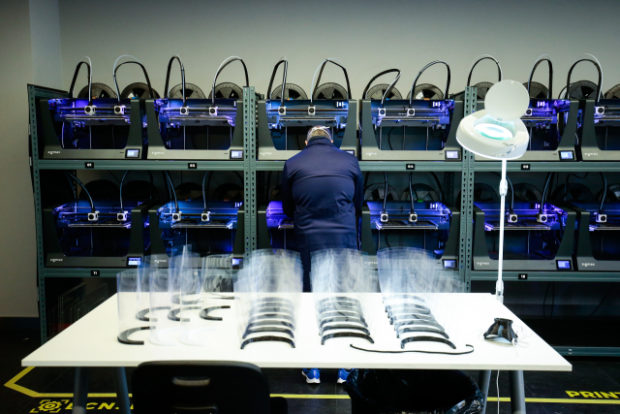
BCN3D company’s communications officer David Martinez checks printers making pieces for face shields destined for sanitary use. Image: AFP/Pau Barrena
A multitude of 3D printers hum nonstop at Spanish firm BCN3D, which like dozens of others across Europe has switched gears to supply hospitals with equipment to fight the coronavirus.
A few days ago the company still was printing parts for other printers, but now it is churning out black frames for face shields needed by doctors and nurses.
“We want to tell the healthcare sector that we are here, they can count on us… to use all our technology in the fight against this serious pandemic,” communications director David Martinez said.
From Castelldefels, 10 kilometers (six miles) down the coast from Barcelona, the company has already supplied more than 1,500 face shields to around 60 hospitals. By the end of the week, they hope to have supplied more than 3,500.
Similar changes are happening across Europe, where a variety of companies are retooling to produce health equipment that is in short supply, from masks to life-saving ventilators.
Spanish perfume maker Puig is whipping up hand sanitizers, while automakers Seat and Renault have altered assembly lines to boost ventilator supplies and Fiat is focusing on face masks. European planemaker Airbus is also making face shields at plants in Spain and Germany.
The fashion industry is doing its part as well against the pandemic that was killed more than 30,000 people in Europe, with more than three-quarters of the deaths registered in Italy and Spain.
Italian retailer Calzedonia, which makes lingerie and beachwear, and Barcelona-based bridal wear firm Pronovias are both now sewing face masks.
“This country’s industry is indispensable now. We are talking about a war industry, a war economy,” Spanish Industry Minister Reyes Maroto said.
Overtime
While many Spaniards are working from home under a nationwide lockdown or have been temporarily laid off, BCN3D employees are doing overtime at their plant.
“We are working many more hours than we did before and are coming in at the weekend voluntarily,” said Nacho Lopez, an engineering student who runs the company’s printer workshop.
Wearing gloves and a face mask, the 23-year-old completes the design of pieces at his computer before sending them to be printed.
The printers heat plastic to 85 degrees Celsius (185 Fahrenheit) so that mechanical arms, with quick and precise movements, can inject the material onto a glass grill where the visors take shape under a bluish light.
“The idea is that they be reusable, that each person has their own and can disinfect them,” said Lopez, who also designed a prototype face mask that is awaiting authorization to be used by health care workers.
Windshield wiper motors
The crucial need for health officials’ approval often slows down the process.
Seat, the Spanish unit of German carmaker Volkswagen, developed 13 prototypes of a ventilator before coming up with one powered by a windshield wiper motor that was cleared for production.
But “knowing that we tried to help one life makes all this work worth it,” Francesc Sabate of the company’s research and development department said in a statement.
Czech carmaker Skoka, another VW brand, halted production for two weeks because of the pandemic but it is now using 3D printers to help make 60 ventilators and 500 FFP-standard face masks per day.
“The advantage of this (face mask) model is its homogeneity,” prototype director David Vanek told Agence France-Presse. “There are no holes or imperfections on the surface, so it can be disinfected and there are no corners where the virus can be trapped.”
Skoda is footing the bill for the high-end masks, which cost five euros ($5.5, around P280) apiece.
For its part, Swiss perfume group Givaudan is retooling its production lines to make disinfectant gel, the firm said Thursday. RGA
RELATED STORIES:
It is now mandatory to wear a face mask in public – IATF
PH gov’t to launch contact tracing app for COVID-19 cases